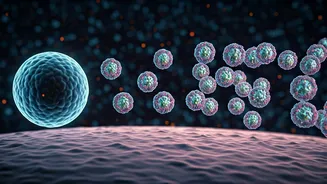mRNA's Cancer Fight
The research into mRNA vaccines for cancer has mirrored the approach used in COVID-19 vaccines. The primary goal is to use the body's own immune system
to target and eradicate cancerous cells. The technology employs messenger RNA, which teaches the body to recognize and react to cancer cells as threats. This innovative strategy differs from traditional chemotherapy, which harms both cancerous and healthy cells. The key benefit of this technique is the potential for precision, activating the body's defenses to attack cancer cells without inflicting damage on healthy tissues. This has the potential to be a significant advancement in cancer treatment strategies.
Immune System Activation
The approach of these vaccines involves presenting cancer cells to the immune system in a way that allows it to recognize and respond. The mRNA instructs cells to produce cancer-specific proteins, essentially training the immune system. Once trained, the immune system can then recognize and attack any cells presenting those proteins, effectively eliminating the cancer cells. This method is designed to activate both T-cells and B-cells, crucial components of the immune response. T-cells directly destroy infected cells, while B-cells produce antibodies that can target cancer cells. Through this dual approach, the vaccine aims to trigger a comprehensive immune response, offering a robust defense against cancer. The aim is to turn the body's natural defenses into a powerful weapon.
Human Trials: The Next Step
With promising results, researchers are moving into human trials to assess the effectiveness and safety of these cancer vaccines. These trials will evaluate the vaccine's ability to trigger an immune response in humans, as well as monitor for potential side effects. The trials involve administering the vaccine to patients with various types of cancer. Doctors and scientists are carefully monitoring the immune responses, tumor regression, and patient outcomes. Human trials represent a crucial phase in the development of any new medical treatment, as they provide critical data on safety, efficacy, and dosage. The results will determine the next steps in bringing these cancer vaccines closer to widespread clinical use, and a potential new hope for cancer patients.
Potential for Universality
The concept of a universal cancer vaccine is a significant aspect of the research. Scientists are working towards a vaccine that can be effective against multiple forms of cancer. This goal is based on the idea that certain cancer-specific proteins are present across different cancer types. The universal approach aims to target these shared characteristics, providing a broad-spectrum defense against cancer. If successful, such a vaccine could have a revolutionary impact, potentially reducing the need for multiple, specialized treatments. This would simplify treatment strategies and offer a unified defense against a disease with many forms. This innovative strategy signifies a major shift in cancer treatment.
Impact and Future
The progress with mRNA cancer vaccines represents a major advancement in medical science. The potential benefits are considerable, from more effective treatment to an overall better quality of life for patients. If these vaccines prove successful, they could significantly enhance cancer treatment approaches. The research offers a renewed hope for individuals and families affected by cancer. The technology's application could extend beyond cancer treatment, impacting other diseases. Researchers continue to explore the capabilities of mRNA technology, aiming to refine existing treatments and develop novel therapies. As these studies progress, they set the stage for a new phase in medical innovation, improving the way we combat complex illnesses.











![[WATCH] T20 World Cup 2026: Gautam Gambhir hosts dinner for Team India players ahead of Namibia clash](https://g-mob.glance-cdn.com/public/fc/image/7gXS1xdhs5Q0.webp)



